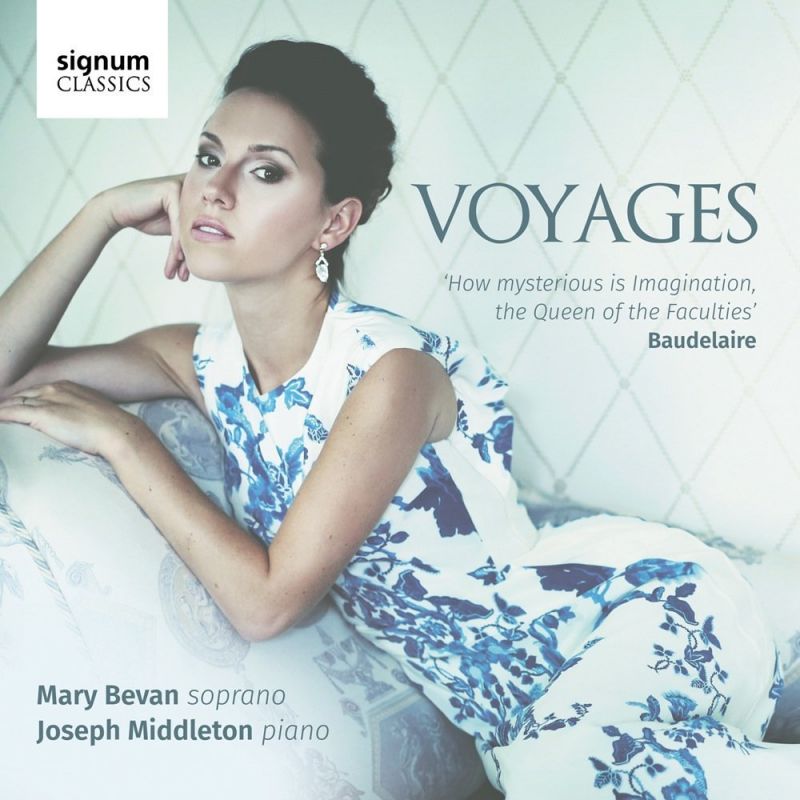Mary Bevan: Voyages
View record and artist detailsRecord and Artist Details
Composer or Director: Franz Schubert, Maurice Rollinat, (Marie-Joseph-Alexandre) Déodat de Séverac, (Marie Eugène) Henri Duparc, Gabriel Fauré, Claude Debussy, Pierre (Eugène Onfroy) de Bréville, (Alexis-)Emmanuel Chabrier
Genre:
Vocal
Label: Signum
Magazine Review Date: 01/2018
Media Format: CD or Download
Media Runtime: 79
Mastering:
DDD
Catalogue Number: SIGCD509

Tracks:
| Composition | Artist Credit |
|---|---|
| (L')Invitation au voyage |
(Marie Eugène) Henri Duparc, Composer
(Marie Eugène) Henri Duparc, Composer Joseph Middleton, Piano Mary Bevan, Soprano |
| (3) Songs, Movement: No. 1, Chant d'automne (wds. Baudelaire: c1871) |
Gabriel Fauré, Composer
Gabriel Fauré, Composer Joseph Middleton, Piano Mary Bevan, Soprano |
| (3) Songs, Movement: No. 2, Hymne (wds. Baudelaire: c1870) |
Gabriel Fauré, Composer
Gabriel Fauré, Composer Joseph Middleton, Piano Mary Bevan, Soprano |
| L'Invitation au voyage |
(Alexis-)Emmanuel Chabrier, Composer
(Alexis-)Emmanuel Chabrier, Composer Joseph Middleton, Piano Mary Bevan, Soprano |
| Romance de Mignon |
(Marie Eugène) Henri Duparc, Composer
(Marie Eugène) Henri Duparc, Composer Joseph Middleton, Piano Mary Bevan, Soprano |
| Hiboux |
(Marie-Joseph-Alexandre) Déodat de Séverac, Composer
(Marie-Joseph-Alexandre) Déodat de Séverac, Composer Joseph Middleton, Piano Mary Bevan, Soprano |
| Harmonie du soir |
Pierre (Eugène Onfroy) de Bréville, Composer
Joseph Middleton, Piano Mary Bevan, Soprano Pierre (Eugène Onfroy) de Bréville, Composer |
| (5) Poèmes de Charles Baudelaire |
Claude Debussy, Composer
Claude Debussy, Composer Joseph Middleton, Piano Mary Bevan, Soprano |
| (La) Vie antérieure |
(Marie Eugène) Henri Duparc, Composer
(Marie Eugène) Henri Duparc, Composer Joseph Middleton, Piano Mary Bevan, Soprano |
| Le jet d'eau |
Maurice Rollinat, Composer
Joseph Middleton, Piano Mary Bevan, Soprano Maurice Rollinat, Composer |
| Kennst du das Land (Mignons Gesang) |
Franz Schubert, Composer
Franz Schubert, Composer Mary Bevan, Soprano |
| Heiss mich nicht reden (Mignon I second version) |
Franz Schubert, Composer
Franz Schubert, Composer Mary Bevan, Soprano |
| So lasst mich scheinen (Mignon II second version) |
Franz Schubert, Composer
Franz Schubert, Composer Mary Bevan, Soprano |
| Nur wer die Sehnsucht kennt (fourth version) |
Franz Schubert, Composer
Franz Schubert, Composer Mary Bevan, Soprano |
Author: Tim Ashley
The immediate musical link is Duparc, whose settings effectively dictate the disc’s structure. His ‘L’invitation au voyage’ establishes the parameters at the outset, while ‘Romance de Mignon’ prefaces Schubert’s Mignon Lieder towards the centre, flanked by further Baudelaire settings, familiar or otherwise. Fauré’s ‘Chant d’automne’, dating from 1870, is a great song – brooding, fierce, harmonically complex – while ‘Hymne’, written the same year, is more conservative and cautious. Déodat de Séverac strikingly links Baudelaire to Schubert by modelling ‘Les hiboux’ on ‘Der Leiermann’ from Winterreise. Debussy and Maurice Rollinat, meanwhile, are at opposite poles in their approaches: Debussy’s Cinq Poèmes are all erotic turbulence and tristesse; cabaret composer Rollinat is knowingly urbane and quietly ironic. It’s never less than fascinating, but doesn’t quite hang together: the preponderance of Baudelaire over Goethe results in the Schubert feeling like a digression at the disc’s centre.
This is no reflection on the performances, however, which are often superb. Bevan’s purity of tone and discreet yet telling way with words can be by turns unnerving and alluring in the Baudelaire settings. Debussy’s Cinq Poèmes have real drama, as rapture turns to regret and pleasure itself becomes itself a torment. She generates tremendous intensity in ‘Chant d’automne’, and the exquisite way she floats the high-lying refrains of Rollinat’s ‘Le jet d’eau’ is simply breathtaking. She’s a fine Mignon, too, sensual in Duparc’s ‘Romance’ – he uses a translation from which Goethe’s darker imagery has been excised – more introverted in the Schubert, where the longed-for other world is perceived, at times, as being beyond the grave. Middleton, as one might expect, is marvellously insightful, playing throughout with weight as well as grace and subtlety. The disc might lack the unity that characterises the finest recitals but it’s all most beautifully done.
Discover the world's largest classical music catalogue with Presto Music.

Gramophone Digital Club
- Digital Edition
- Digital Archive
- Reviews Database
- Full website access
From £8.75 / month
Subscribe
Gramophone Full Club
- Print Edition
- Digital Edition
- Digital Archive
- Reviews Database
- Full website access
From £11.00 / month
Subscribe
If you are a library, university or other organisation that would be interested in an institutional subscription to Gramophone please click here for further information.




